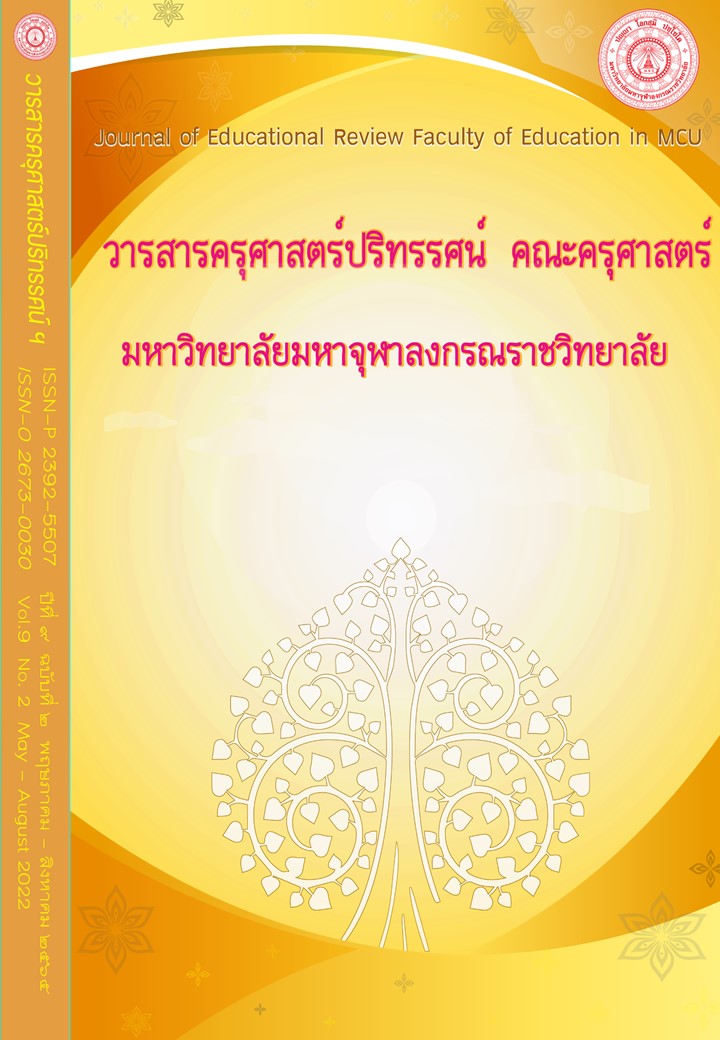DIGITAL CITIZEN IN YOUNG CHILDREN
Main Article Content
Abstract
Early childhood in the 21st century is developing rapidly in the age of education with the advancement of information technology continuously. There are many ways of learning. Children of this era need life skills to create opportunities to become a digital citizen and to be able to know digital media due to the factors and risks in the digital age that influence early childhood development. Including creating opportunities for early childhood to citizenship in the digital age by having teachers and parents to be and important key mechanism for quality of childhood development through the role as a good example. Moreover, have the ability to screen media quality and have coordination skills to promote proper learning for early childhood. In order to reduce the risks that can happen to the children, Therefore, digital media technology has been developed to be used in educational management for early childhood children, which has become more active in the daily lives of children or may become part of the lives of adults and their children. If children are not taken care for using media, the consequences are they will consume media and addicted to inappropriate contents. Especially sexual behaviors, violence, imitations and consumerism.
Article Details

This work is licensed under a Creative Commons Attribution-NonCommercial-NoDerivatives 4.0 International License.
ทัศนะและความคิดเห็นที่ปรากฏในบทความในวารสารฉบับนี้ถือเป็นความรับผิดชอบของผู้เขียนบทความนั้นเพียงผู้เดียว และไม่ถือเป็นทัศนะและความรับผิดชอบของกองบรรณาธิการ
กองบรรณาธิการขอสงวนสิทธิ์ในการคัดเลือกบทความลงตีพิมพ์และจะแจ้งให้เจ้าของบทความทราบหลังจากผู้ประเมินบทความตรวจอ่านบทความแล้ว
ต้นฉบับที่ได้รับการตีพิมพ์ในวารสารครุศาสตร์ปริทรรศน์ คณะครุศาสตร์ มหาวิทยาลัยมหาจุฬาลงกรณราชวิทยาลัย ถือเป็นกรรมสิทธิ์ของคณะครุศาสตร์ มหาวิทยาลัยมหาจุฬาลงกรณราชวิทยาลัย ห้ามนำข้อความทั้งหมดหรือบางส่วนไปพิมพ์ซ้ำ เว้นเสียแต่ว่าจะได้รับอนุญาตจากมหาวิทยาลัยฯ เป็นลายลักษณ์อักษร
References
กุลชาติ พันธุวรกุล, เมษา นวลศรี. (2562). เด็กปฐมวัยกับการเป็นพลเมืองดิจิตอล : โอกาสหรือความเสี่ยง. วารสารครุศาสตร์ จุฬาลงกรมหาวิทยาลัย. 17(2). 1-23.
ชนพรรณ จารเสถียร. (2560). การใช้สื่อเทคโนโลยีสำหรับเด็กปฐมวัย. กรุงเทพมหานคร: สมาคมอนุบาลแห่งประเทศไทย.
ปณิตา วรรณพิรุณ, นำโชค วัฒนานัณ. (2560). บทความวิชาการเรื่อง ความฉลาดทางดิจิตอล. วารสารพัฒนาเทคนิคศึกษา. 29(102). 12-20.
ประยุทธ์ จันทร์โอชา. (2560). คำขวัญวันเด็ก "รู้คิด รู้เท่าทัน สร้างสรรค์เทคโนโลยี. แหล่งที่มา https://www.dailynews.co.th/politics/617427. สืบค้นเมื่อ 10 เม.ย. 2563.
พนิดา ชาตยาภา. (2559). เทคโนโลยีกับเด็กปฐมวัยในศตวรรษที่ 21. วารสารวไลยอลงกรณ์ปริทัศน์(มนุษยศาสตร์และสังคมศาสตร์). 6(2). 151-162.
พัชรี บอนคำ. (2561). เด็กยุคใหม่รู้เท่าทัน "สื่อดิจิตอล. แหล่งที่มา http://www.thaihealth.or.th/Content/40229. สืบค้นเมื่อ 11 มี.ค. 2563.
วรพจน์ วงศ์กิจรุ่งเรือง. (2561). คู่มือพลเมืองดิจิทัล. กรุงเทพมหานคร: ดิวันโอวัน เปอร์เซนต์.
วรลักษณ์ สงวนแก้ว. (2559). Digital Citizens: พลเมืองดิจิทัล. แหล่งที่มา https://www.stou.ac.th/study/sumrit/1-59(500)/page2-1-59(500).html. สืบค้นเมื่อ 11 มี.ค. 2563.
สำนักงานส่งเสริมสังคมแห่งการเรียนรู้และคุณภาพเยาวชน (สสค.). การใช้สื่อเทคโนโลยีสำหรับเด็กปฐมวัย. แหล่งที่มา http://www.qlf.or.th. สืบค้นเมื่อ 10 เม.ย. 2563.
โสภิดา วีรกุลเทวัญ. (2561). เท่าทันสื่อ: อำนาจในมือพลเมืองดิจิทัล. กรุงเทพมหานคร: สถาบันสื่อเด็กและเยาวชน.
DQ Institute. (2017). Digital intelligence (DQ) A conceptual framework & methodology for teaching and measuring digital citizenship. Singapore: DQ Institute.
Pellissier Hank. (2018). Your child’s brain on technology: social media. From https://www.greatschools.org/gk/articles/child-brain-development-and-social-media/. Retrieved Apr 10, 2020.
Rogow, F. (2002). ABCs of media literacy: What can pre-schooolers learn?. From www.medialit.org/reading-room/abcs-media-literacy-what-can-pre-schooolers-learn. Retrieved Apr 10, 2020.


